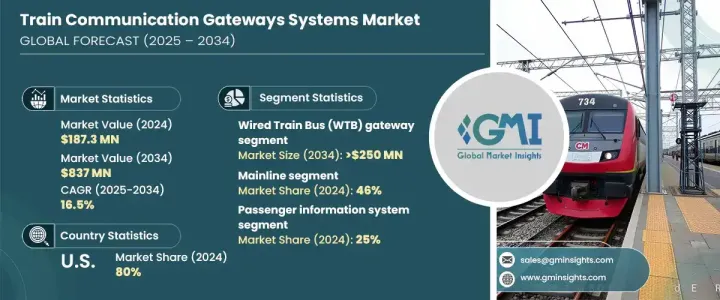
세계 열차 통신 게이트웨이 시스템 시장은 2024년에 1억 8,730만 달러로 평가되며, 2025-2034년 동안 CAGR 16.5%로 크게 성장할 것으로 예상됩니다.
보다 효율적이고 편안한 이동 수단에 대한 수요가 증가함에 따라 각국 정부는 철도 인프라에 대한 대규모 투자를 촉진하고 있습니다. 열차 통신 게이트웨이 시스템과 같은 최신 기술의 도입이 증가함에 따라, 운송 효율성 향상, 안전성 개선, 열차와 관제센터 간의 원활한 통신을 촉진하는 것이 목표가 되고 있습니다. 이러한 원활한 통합의 필요성은 원활한 운영을 유지하고 지연을 최소화하며 성능을 최적화하기 위해 실시간 데이터 교환에 크게 의존하는 도시 철도 시스템 및 고속철도의 인기가 높아짐에 따라 더욱 커지고 있습니다. 기술 중심의 철도 네트워크가 가속화됨에 따라 현대 교통 시스템의 복잡하고 빠른 요구 사항을 충족시킬 수 있는 첨단 통신 솔루션에 대한 수요도 증가하고 있습니다.

열차 통신 시스템은 다양한 종류의 철도 시스템을 효과적으로 관리하는 데 매우 중요합니다. 이러한 시스템은 열차, 신호 장치 및 제어 센터 간의 지속적인 통신을 가능하게 하여 안전하고 적시에 운행할 수 있도록 보장합니다. 이 시장은 보다 빠르고 안정적인 데이터 전송을 가능하게 하는 기술 발전이 큰 원동력이 되고 있습니다. 화물 및 여객 운송 모두에서 효율성에 대한 요구가 증가함에 따라 최첨단 통신 솔루션에 대한 수요가 증가하고 있습니다. 또한, 철도 부문의 탄소 배출량 감소와 에너지 효율성 향상에 대한 관심이 높아지면서 전기화된 열차 네트워크를 지원하는 통신 시스템의 급속한 확장에 기여하고 있습니다.
| 시장 범위 | |
|---|---|
| 시작 연도 | 2024년 |
| 예측 연도 | 2025-2034년 |
| 시작 금액 | 1억 8,730만 달러 |
| 예상 금액 | 8억 3,700만 달러 |
| CAGR | 16.5% |
시장은 WTB(유선 철도 버스) 게이트웨이, MVB(다기능 차량 버스) 게이트웨이, ECN(이더넷 통신 네트워크) 게이트웨이 등 오퍼링에 따라 세분화됩니다. 2024년에는 WTB 게이트웨이가 시장 점유율의 40%를 차지했으며, 2034년에는 WTB 게이트웨이는 도시철도 및 고속철도 시스템에서 도시철도 및 고속철도 시스템에서 중요한 역할을 하며, 열차와 관제센터 간의 안정적인 통신을 보장하는 데 중요한 역할을 합니다. 견고한 설계, 낮은 지연, 높은 연결성은 WTB 게이트웨이가 선택되는 주요 이유입니다. 실시간 모니터링을 제공하고, 열차 성능을 최적화하며, 더 나은 스케줄링, 안전 및 운영 관리에 기여합니다.
열차 유형에 따라 시장은 간선, 도시, 화물 시스템으로 분류되며, 2024년에는 도시와 주변 지역을 연결하는 간선 열차가 시장 점유율의 46%를 차지했습니다. 이러한 열차는 장거리 운송 및 화물 운송에 필수적이며, 안전, 정시성 및 운영 효율성을 보장하기 위해 신뢰할 수 있는 통신 시스템이 필요합니다. 여객 및 화물 수요의 증가로 인해 원활한 운행을 위해 실시간 통신이 필수적인 장거리 고속철도 운행에는 강력한 통신 시스템이 필수적입니다.
미국에서는 열차 통신 게이트웨이 시스템 시장이 2024년 세계 시장 점유율의 80%를 차지했습니다. 미국 철도 산업이 탄소 배출량을 줄이고 효율성을 높이기 위해 전기화로 전환함에 따라 첨단 통신 시스템에 대한 수요가 급증하고 있습니다. 열차 통신 게이트웨이는 새로운 전력 시스템과 기존 열차 네트워크 간의 효과적인 통신을 가능하게 하고 모든 구성요소의 원활한 통합을 보장합니다. 이러한 통합은 미국 철도 인프라에서 혁신적인 철도 기술의 지속적인 개발에 필수적입니다.
The Global Train Communication Gateways System Market was valued at USD 187.3 million in 2024 and is expected to grow significantly at a CAGR of 16.5% from 2025 to 2034. The rising demand for more efficient and comfortable travel options is driving substantial investments by governments in rail infrastructure. With the growing adoption of modern technologies, such as train communication gateway systems, the goal is to enhance transportation efficiency, improve safety, and facilitate better communication between trains and control centers. This need for seamless integration is amplified by the increasing popularity of urban rail systems and high-speed trains, which depend heavily on real-time data exchange to maintain smooth operations, minimize delays, and optimize performance. The acceleration of technology-driven rail networks is also contributing to the rising demand for sophisticated communication solutions that can accommodate the complex, high-speed demands of contemporary transit systems.

Train communication systems are crucial for the effective management of various types of rail systems. These systems allow for continuous communication between trains, signaling equipment, and control centers, ensuring safe and timely operations. This market is largely driven by advancements in technology that allow faster, more reliable data transfer. The increasing need for efficiency in both freight and passenger transportation is creating a greater demand for state-of-the-art communication solutions. Additionally, there is a rising focus on reducing carbon emissions and boosting energy efficiency within the rail sector, contributing to the rapid expansion of communication systems that support electrified train networks.
| Market Scope | |
|---|---|
| Start Year | 2024 |
| Forecast Year | 2025-2034 |
| Start Value | $187.3 Million |
| Forecast Value | $837 Million |
| CAGR | 16.5% |
The market is segmented based on offerings, including WTB (wired train bus) gateways, MVB (multifunction vehicle bus) gateways, and ECN (Ethernet communication network) gateways. In 2024, WTB gateways represented 40% of the market share and are expected to generate USD 250 million by 2034. WTB gateways are critical in ensuring reliable and continuous communication between trains and control centers, playing a vital role in urban and high-speed rail systems. Their robust design, low latency, and high connectivity are key benefits that make them a preferred choice. They provide real-time monitoring, optimize train performance, and contribute to better scheduling, safety, and operational management, driving their adoption across global rail networks.
When it comes to train types, the market is categorized into mainline, urban, and freight systems. In 2024, mainline trains, which connect cities and surrounding areas, accounted for 46% of the market share. These trains are essential for long-distance and freight transportation, requiring communication systems that are highly reliable to ensure safety, punctuality, and operational efficiency. The increasing demand for both passenger and freight services means that robust communication systems are indispensable for long-distance, high-speed rail operations, where real-time communication is crucial for seamless operations.
In the U.S., the train communication gateways system market commanded 80% of the global share in 2024. As the U.S. railway industry transitions toward electrification to reduce carbon emissions and increase efficiency, the demand for advanced communication systems has surged. Train communication gateways enable effective communication between new electric power systems and the existing train networks, ensuring seamless integration of all components. This integration is vital for the continued development of innovative rail technologies in the U.S. rail infrastructure.